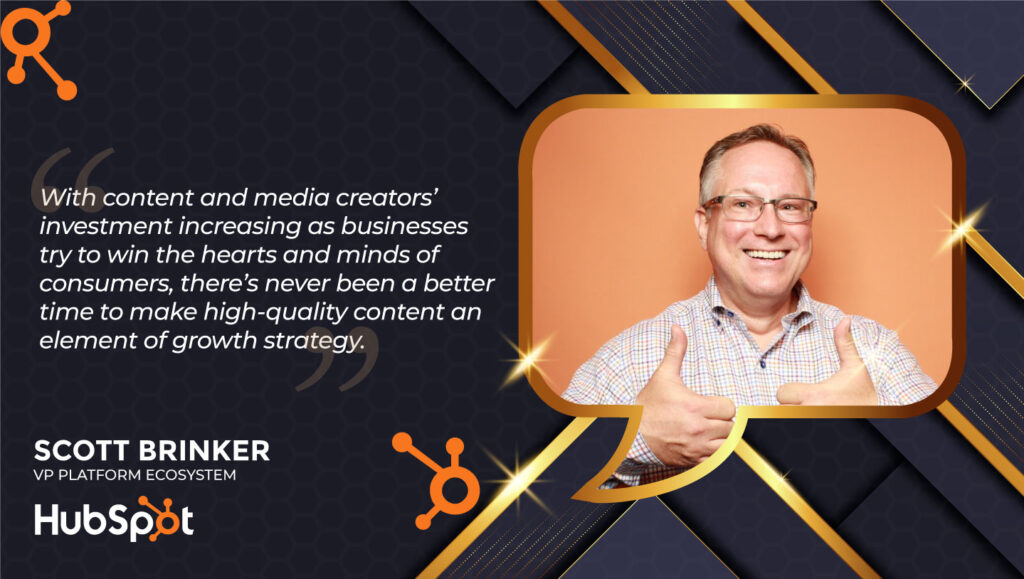
Hi Scott, welcome to our interview series. How have customer experience management benchmarks evolved during the pandemic?
Effective content marketing is gold dust in the modern, digital age. Competition is fierce among B2B companies, especially in the technology space. Many enterprises struggle to get the cut-through with banner ads and LinkedIn sponsored posts. Next year, it will be more challenging than ever before for businesses to grab the attention of prospects.
In response, expect to see a growing trend towards businesses becoming media companies of their own. Rather than risk getting lost in the content crossfire on various channels, many SaaS companies will transform into media companies in their own right in an attempt to claw back valuable customer attention. We’ll also likely see current media companies struggle to keep pace as their market becomes increasingly saturated.
With content and media creators’ investment increasing as businesses try to win the hearts and minds of consumers, there’s never been a better time to make high-quality content an element of your growth strategy in 2022.
Latest ITechnology Interview: ITechnology Interview with Simon Kvist Gaulshøj, CEO at Adnami
Do you think brands are using technology in the most effective manner to deliver relevant customer experiences to their targeted user groups?
Demand for both human and technology-driven experiences is stronger and more complex than ever. For brands, it’s important to remember that while the customer journey has changed vastly over the last year and a half – with the number of digital channels available to engage with customers growing day by day – consumers still want a ‘human touch’ element as much online, as they do in-store. While customers certainly won’t be looking to compromise on the digital conveniences they’ve grown accustomed to and, in some cases, even reliant upon, they still want to be able to connect one-on-one with an advisor as and when is needed.
Investments in customer service technology are poised to skyrocket this year, but whether that’s in AI, VR or chatbots, supporting the “human touch” element will remain key.
Should marketers train for analytics and data reporting? What are the best tools in the market that could enable marketers deliver better outcomes with their data and analytics journeys?
Absolutely. The importance of data in informing the customer experience is only growing. And, as customer insights have sky-rocketed in business value, operations teams have become pivotal to using that data more constructively so that organisations can develop a deeper understanding of their customers’ needs and wants, and effectively meet customers’ expectations. Customers want to be cared for, whether they pick up the phone to a salesperson or open a marketing email, and operations professionals help those relationships to flourish by simply formatting that data in a way that works for everyone. Not only do they carry the responsibility of ensuring that marketing, sales and customer service teams are set up for success, and everything within a business operates just as it should, but they have turned into the orchestrators of the customer experience.
Latest ITechnology Interview: ITechnology Interview with Patricia Nagle, President, Americas at TeamViewer
What’s the biggest challenge to effectively build a marketing and sales technology stack in the modern era? How has Marketing Ops become an important component in this process?
As the adage goes, information is power. Historically, customer-facing teams within the same organisation have operated within siloes, which meant that insights on customers weren’t shared or actioned. Customers are becoming more demanding when it comes to their digital experiences, and they expect a seamless one with the businesses they interact with regardless of which team they’re engaging with. It’s become critical for companies to break down internal silos and think first and foremost about the customer.
2022 will be the year in which we’ll see more collaboration and alignment between marketing, sales and customer service teams. With so many companies putting digital experiences first, poor customer experience becomes a real barrier to sales and in return, to hard-fought sales targets. While marketing, sales and customer experience teams might need to utilise different data points, each team will need to understand the full lifecycle of that customer’s journey. Harnessing the collective power of these 3 functions will be a priority for the year ahead for savvy businesses, with modern CRM being instrumental in solving for the customer.
Latest ITechnology Interview: ITechnology Interview with Juan Asenjo, Director of Product Solutions at Entrust
Digital buying experiences have evolved tremendously in the last 3-4 years. Do you think businesses can survive the competition without a website? What lessons can business leaders take from best website designing agencies and content marketing companies?
Ultimately, no – businesses cannot survive against their competition without a website. In today’s digital age, your website is the front door to your business so it’s critical that it’s a successful one that provides a delightful experience. Particularly now that restrictions have eased, customers will be expecting the same accessibility and convenience that companies have offered them over the last 18 months. Providing this level of service means handling an increase in traffic and, essentially, scaling up. Seamless digital buying experiences are here to stay, so businesses need to start treating their websites like a product, making them something that they are constantly investing in and improving.
And, for those that have already, next year is a time to build on that good work so that customers can seamlessly move between desktop and mobile devices on a company’s website – without the user experience being in any way compromised. People want to be able to get answers to their needs and wants and tapping into that demand requires companies to optimise their channels to provide a delightful website experience.
Thank you, Scott! That was fun and we hope to see you back on AiThority.com soon.
[To participate in our interview series, please write to us at sghosh@martechseries.com]
I am fascinated by the intersection of technology platforms and ecosystems and marketing strategy and operations.
As VP Platform Ecosystem at HubSpot, I shape the company’s platform strategy and lead business programs for its global technology partner ecosystem. Before that, I was the co-founder and CTO of ion interactive, a SaaS company that pioneered interactive content for global enterprises (Cisco, Dell, DHL, General Mills, Microsoft, etc.) and was acquired in 2017.
Since 2008, I’ve also run the Chief Marketing Technologist blog, chiefmartec.com, with over 50,000 readers, analyzing topics at the intersection of marketing, technology, and management. As one of my projects, I created the Marketing Technology Landscape, mapping the growth of the marketing technology industry from a few hundred vendors to 8,000. In 2014, I launched the MarTech conference, where I currently serve as the event’s program chair, bringing together a community of thousands of senior marketing operations and technology professionals.
HubSpot is a leading customer relationship management (CRM) platform that provides software and support to help companies grow better. The platform includes marketing, sales, service, operations, and website management products that start free and scale to meet our customers’ needs at any stage of growth. Today, more than 121,000 customers across more than 120 countries use HubSpot’s powerful and easy-to-use tools and integrations to attract, engage, and delight customers.
Named Glassdoor’s #4 Best Place to Work in 2021, HubSpot has been recognised for its award-winning culture by Great Place to Work, Comparably, Fortune, Entrepreneur, Inc., and more. HubSpot was founded in 2006 and is headquartered in Cambridge, Massachusetts. The company’s thousands of employees work across the globe in HubSpot offices and remotely.



